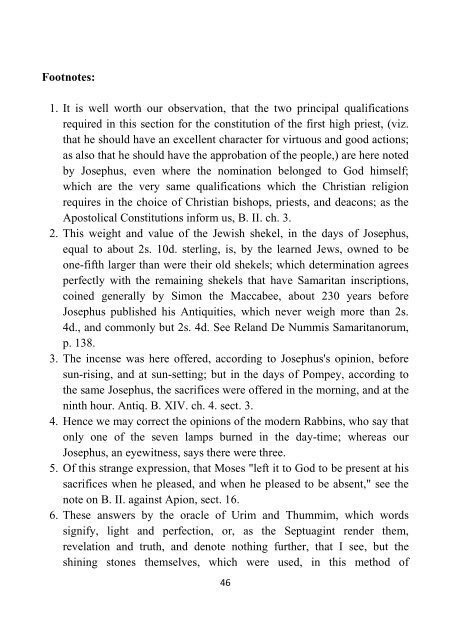From the Exodus Out of Egypt to the Rejection of That Generation - Flavius Josephus
You also want an ePaper? Increase the reach of your titles
YUMPU automatically turns print PDFs into web optimized ePapers that Google loves.
Footnotes:<br />
1. It is well worth our observation, that <strong>the</strong> two principal qualifications<br />
required in this section for <strong>the</strong> constitution <strong>of</strong> <strong>the</strong> first high priest, (viz.<br />
that he should have an excellent character for virtuous and good actions;<br />
as also that he should have <strong>the</strong> approbation <strong>of</strong> <strong>the</strong> people,) are here noted<br />
by <strong>Josephus</strong>, even where <strong>the</strong> nomination belonged <strong>to</strong> God himself;<br />
which are <strong>the</strong> very same qualifications which <strong>the</strong> Christian religion<br />
requires in <strong>the</strong> choice <strong>of</strong> Christian bishops, priests, and deacons; as <strong>the</strong><br />
Apos<strong>to</strong>lical Constitutions inform us, B. II. ch. 3.<br />
2. This weight and value <strong>of</strong> <strong>the</strong> Jewish shekel, in <strong>the</strong> days <strong>of</strong> <strong>Josephus</strong>,<br />
equal <strong>to</strong> about 2s. 10d. sterling, is, by <strong>the</strong> learned Jews, owned <strong>to</strong> be<br />
one-fifth larger than were <strong>the</strong>ir old shekels; which determination agrees<br />
perfectly with <strong>the</strong> remaining shekels that have Samaritan inscriptions,<br />
coined generally by Simon <strong>the</strong> Maccabee, about 230 years before<br />
<strong>Josephus</strong> published his Antiquities, which never weigh more than 2s.<br />
4d., and commonly but 2s. 4d. See Reland De Nummis Samaritanorum,<br />
p. 138.<br />
3. The incense was here <strong>of</strong>fered, according <strong>to</strong> <strong>Josephus</strong>'s opinion, before<br />
sun-rising, and at sun-setting; but in <strong>the</strong> days <strong>of</strong> Pompey, according <strong>to</strong><br />
<strong>the</strong> same <strong>Josephus</strong>, <strong>the</strong> sacrifices were <strong>of</strong>fered in <strong>the</strong> morning, and at <strong>the</strong><br />
ninth hour. Antiq. B. XIV. ch. 4. sect. 3.<br />
4. Hence we may correct <strong>the</strong> opinions <strong>of</strong> <strong>the</strong> modern Rabbins, who say that<br />
only one <strong>of</strong> <strong>the</strong> seven lamps burned in <strong>the</strong> day-time; whereas our<br />
<strong>Josephus</strong>, an eyewitness, says <strong>the</strong>re were three.<br />
5. Of this strange expression, that Moses "left it <strong>to</strong> God <strong>to</strong> be present at his<br />
sacrifices when he pleased, and when he pleased <strong>to</strong> be absent," see <strong>the</strong><br />
note on B. II. against Apion, sect. 16.<br />
6. These answers by <strong>the</strong> oracle <strong>of</strong> Urim and Thummim, which words<br />
signify, light and perfection, or, as <strong>the</strong> Septuagint render <strong>the</strong>m,<br />
revelation and truth, and denote nothing fur<strong>the</strong>r, that I see, but <strong>the</strong><br />
shining s<strong>to</strong>nes <strong>the</strong>mselves, which were used, in this method <strong>of</strong><br />
46

















